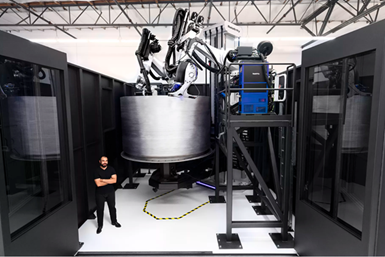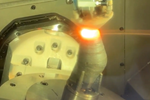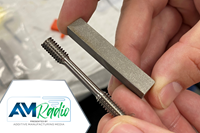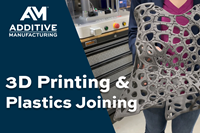Clean TeQ, Relativity Space Collaborate on Scandium Aluminium Alloys for 3D Printing of Rockets
Project to develop scandium-aluminium alloys for 3D printing of launchers for commercial orbital launch services.
Share

3D printing of the Terran 1 launch vehicle at Relativity’s Stargate factory.
Clean TeQ Holdings Limited is collaborating with Relativity Space Inc. to develop scandium-aluminium alloys for 3D printing of launchers for commercial orbital launch services. The two companies have also agreed to a binding Scandium Offtake Heads of Agreement for the Company to supply scandium oxide (volumes to be determined at Relativity’s election) from Clean TeQ’s Sunrise Project in New South Wales, Australia.
Clean TeQ’s technical and marketing team will work closely with Relativity on development of scandium-containing alloys for Relativity’s Stargate 3D printing process. The company says that, so far, the results are encouraging and trials are progressing.
Clean TeQ’s Sunrise Project is being developed as one of the world’s largest integrated producers of nickel sulphate and cobalt sulphate – key cathode materials for the electric vehicle battery market, according to the company. However, it also hosts one of the largest and highest grade scandium deposits ever discovered, positioning Clean TeQ to be a major supplier of low-cost scandium for production of next-generation lightweight aluminium alloys for use in a variety of industries, including aerospace, automotive and consumer products
Headquartered in Los Angeles, California, Relativity Space Inc. is a private American aerospace manufacturing company which is developing its Terran 1 (the world’s first 3D-printed space launch rocket) and Aeon engines for commercial orbital launch services.
Aerospace manufacturing has traditionally relied on large factories, fixed tooling, complex supply chains and extensive manual labor to build costly rockets comprised of more than 100,000 parts, with lead times of two years or more. Relativity has engineered and built the Stargate factory, the first aerospace platform to automate rocket manufacturing, vertically integrating intelligent robotics, software and data-driven 3D printing technology.
Incorporating the world’s largest metal 3D printers and artificial intelligence driven controls, the company says that the Stargate factory continuously optimizes production, resulting in greatly enhanced quality and time improvements, lower costs and part counts, and product designs previously not possible. Relativity has developed multiple proprietary alloys, custom designed for 3D printing to meet mission-critical performance.
Related Content
-
3 Points About 3D Printing Large Parts We Can Learn From the Lunar Habitat (Video)
Ingersoll Machine Tools describes the capabilities and promise of large-scale additive manufacturing as seen in the 3D printed sections of the Rosenberg Space Habitat.
-
Arburg Freeformer 750-3X 3D Features Larger Build Chamber
Formnext 2022: The Freeformer 750-3X 3D provides more space inside the build chamber for larger components.
-
8 Transformations 3D Printing Is Making Possible
Additive manufacturing changes every space it touches; progress can be tracked by looking for moments of transformation. Here are 8 places where 3D printing is enabling transformative change.














